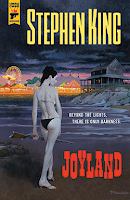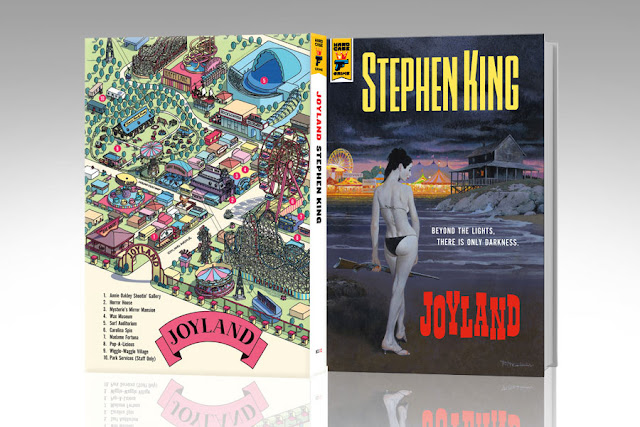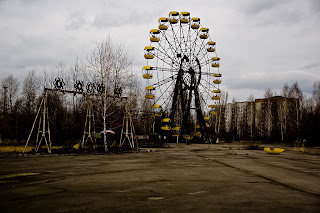“There are things that happened once upon a time and long ago, in a magical year when oil sold for $11 a barrel. The year I got my damn heart broke. The year I lost my virginity. The year I saved a nice little girl from choking and a fairly nasty old man from dying of a heart attack. The year a madman almost killed me on a Ferris Wheel. The year I wanted to see a ghost and didn’t… although I guess at least one of them saw me. The year I learned to talk a secret language and how to dance the Hokey Pokey in a dog costume. The year I discovered there are worse things than losing the girl.
The year I was twenty-one, and still a greenie.”
The above, from the last few pages of HCC-112, Stephen King’s Joyland, makes a better summary/ recap than any back cover copy or wiki-summary I could quote. That’s the book right there. Only thing missing: “the year I met a boy with second sight and the year my plot arc ended with a big-ass storm.” Aka “the year I lived out a Stephen King novel.”
A few months back I wrote a post on different ways of reading Stephen King. I used King as an example, although the same principle applies to any (or most any) author, really. But hey what do you know, here we are and King is again a pertinent example. There are two ways of reading Joyland. Well, at least two, but here are the two I’ll consider today: (1) As a Stephen King novel. (3) As a Hard Case Crime novel.
As a King novel, I was surprised to discover I didn’t much care for it on reread. I liked it pretty well the first time I read it, but this time it felt mostly like just a lot of tricks, King in full-carny mode. * Everything seems designed to dazzle the eye and move things along but there’s not much “there” there besides a lot of stock characters, sentiments, and situations. All brought to life with King’s usual facility, of course, but there’s an awful lot of sales pitch here. King uses every one of his cheaper array of tricks, such as deliberately dangling incomplete information before the reader to create page-turning urgency.
* There's a character in the novel (who is actually one of the maybe-he's-the-killer suspects, so I won't name him) that seems to me like King donning a two-dimensional diving suit (as Grant Morrison referred to the action of an author putting himself directly into the story: something King knows a thing or two about!). Which one is he? I leave it to readers to deduce...
One of many examples: the holding back of the killer’s identity once Devin figures it out, despite the inevitable (and immediate) “I know you know and I’ll kill your pretty girlfriend unless you meet me at the so-and-so” that follows the conversation. But also just the narrative tone of nostalgia. A little of that goes a long way. When I read “when you’re twenty-one, life is a roadmap. It’s only when you get to be twenty-five or so that you begin to suspect you’ve been looking at the map upside down, and not until forty are you entirely sure” in the early part of the book, it’s fine. It’s more than fine – it’s the voice of aged wisdom looking back at youth, etc. In the first few pages you feel like you're settling into that and it's aA fine voice for a novel. But there’s something like that on every other page. By the time I got to “When it comes to the past, everyone writes fiction” before even page 50, I was telling the narrator "ok you need to knock that off, friend" in my head.
The main protagonist Devin is one of King’s boy scout protagonists (see Finders Keepers, Dreamcatcher, et al). The villain starts as one of King’s stock characters and ends as another, right down to super-villain monologues and shouting out ad-jingles, etc. This on top of other King clichés, some mentioned above but others strewn throughout, made me re-evaluate this one as one of King’s lesser efforts. Some nice period nostalgia here there and around the square, and (it being a King novel) a fairly effortless read, despite its overwrought tone, but there’s fifty King books I’d recommend to the proverbial Young King Reader before this one.
(It’s also reminiscent of Bag of Bones in a lot of respects. I really need to re-read that one again. Now would be a good time while this is fresh in mind so I could better sketch out the similarities between the works. But I think I’ll be continuing with my HCC reading for a spell longer before taking a break. More exciting backstage dispatches as events unfold.)
That said, the right movie/ show that followed the events of the book in the exact order they’re written and true to the tone/ everything might actually be a masterpiece. Weird, eh? It’s one of those right-trick-of-light books for a film adaptation. We’ll see, I guess, how the upcoming adaptation approaches things. I hope there’s no one in bad old man make-up narrating things from a nursing home bed.
Now, switching to As a Hard Case Crime Novel. At first glance, it’s an awkward fit; this is clearly a collection of King clichés, simply repackaged as new product. Anyone who’s studied King’s work can take this one part and see the “Made in Bag of Bones” or “Here Comes the Telepathic Kid” stamps on different pieces of construction. (While we're here, King lifted Joyland's ending for later use in Elevation, as well, tweaking it only a little bit. I wonder if he's aware of this, or, more specifically, his editor is/was?)
Yet, this actually works pretty darn well as boilerplate for other non-author-specific genre things. So many of the things we see here (the dog barking at the empty haunted house ride, Erin with her research and info-dump, the skeptic of the group seeing the ghost, losing one’s virginity to the hot mom, the reveal of the villain – who really could only be one person, which is of itself kind of a genre staple: the not-really-a-reveal-reveal/ process-of-elimination-has-to-be-one-of-these-characters,-right? process) are the kind of things we’d see in certain type of horror movie. The King elements that might distract me a little if viewing the work as another King work don’t distract if viewing them as complementing a more traditional horror/mystery narrative.
In other words, this is kind of a great Hard Case Crime novel, and it's those elements of it that the King-reader in my identifies me as boilerplate-King that really move things along. It's not my favorite King by a long stretch, but it definitely fits in well with the HCC catalog. If there's a perfect marriage of HCC/genre-novel and Stephen King, Joyland is probably it. It's only too bad he didn't have The Stand, another awesome-but-uneasy genre/King blend, lying around to give to Charles Ardai when he came sniffing around for product. "Sure, here's something for your little book line." That'd have been mega.
So I find myself in the weird position of assigning three different grades: A C+ as a straight-King effort, a solid A- as a Hard Case Crime novel, and maybe a B as a standalone genre effort. I mean, is it better than Peter Benchley's Jaws? That's a good benchmark for this sort of book. Yes, it is.
And still another: if it was the only King book to exist (a What-If scenario I enjoy considering) none of my eye-rolling about certain King go-tos would exist, so how would I rate it then? Probably a B+ with a "I liked that - I'll read more by him". Why is this? All of the above, though I'm not quite sure I conveyed how it all breaks down in my head in this post.
"History is the collective and ancestral shit of the human race, a great big and ever growing pile of crap. Right now, we're standin at the top of it, but pretty soon we'll be buried under the doodoo of generations yet to come. That's why your folks' clothes look so funny in old photographs, to name but a single example. And, as someone who's destined to buried beneath the shit of your children and grandchildren,
I think you should be just a leetle more forgiving.”
~
The Hard Case Crime Chronicles will continue with...
Quarry's Choice by Max Allan Collins.
Appearing sooner or later. See you then.















